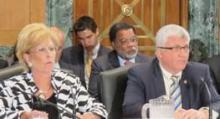He called on Congress and the administration to provide leadership. Physicians want to be involved in changing the system, but they are only one piece, he said. Policymakers also need to work with drug and device companies and hospitals to cut back on waste and make the health care system more sustainable.
"The further we delay these decisions, the more costly it is," Dr. Zoghbi said.
Gail Wilensky, Ph.D., who ran the Medicare and Medicaid programs from 1990 to 1992, agreed.
She suggested a number of payment alternatives Congress could consider, including bundling physician payments for high-cost, high-volume interventions.
Now Congress needs to direct the Centers for Medicare and Medicaid Services or the Medicare Payment Advisory Commission to come up with a plan and give them a firm deadline, she said. With that plan in hand, it would be easier for members of Congress to justify spending $300 billion to replace the SGR system.
"Until they do that, you don’t have anything to talk about," said Dr. Wilensky, who is currently an economist and senior fellow at Project HOPE.
Physicians can do their part to speed the legislative heavy lifting by presenting concrete alternatives with a real capacity to cut costs for the health care system, said Dr. Mark B. McClellan, who was the CMS administrator from 2004 to 2006 and is now director of the Engelberg Center for Health Care Reform at the Brookings Institution.
He cited some of the medical-home models that have been implemented by private health plans as good examples. These medical homes provide substantially better up-front payments for primary care physicians but also make physicians accountable for keeping overall costs down.
"Leadership on this is going to have to come from physicians and physician organizations," Dr. McClellan said. "Congress and the Medicare program are under a lot of pressure to do more to balance the budget, to do more to keep costs down while keeping quality up. They don’t have the best ideas. Physicians do."
Dealing with the Status Quo
Although most physicians don’t believe that Congress will allow large cuts to physician payment to go into effect, it’s possible that the trend of enacting temporary payment patches could continue for a few years.
If the status quo persists, it would make it increasingly difficult for physicians to plan their expenses and run their offices, said Dr. Glen R. Stream, president of the American Academy of Family Physicians.
"It tests people’s willingness to continue to participate in the Medicare program," Dr. Stream said. "So often we don’t look at doctors’ offices, particularly small offices, as businesses. And yet they are businesses and they have expenses that are going up all the time as far as insurance, utilities, and staff."
More practices will critically evaluate their continued participation in Medicare, he said.
No matter what the outcome of November’s election, lawmakers will have to address the physician payment issue, Dr. Stream said. His biggest concern right now is that the election continues the partisan stalemate of the last few years.
"That stalemate in a lot of ways could actually be more harmful to evolving so many things about our health care system, including the physician payment piece," he said.



